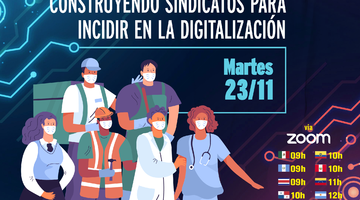
Daniel Bertossa
Our Digital Future
Project Homepage
This capacity-building project aims to empower public service unions to understand and act on digitalisation-related changes at the workplace and in public service delivery.
Overview
If unions are ready to shape the digital transformation in the public interest, there is a huge opportunity to grow labour power, improve public services and win democratic control over our data.
But to do this, we must build an understanding of how the current transformation is being shaped to primarily serve private actors at the expense of democratic control and be ready to effectively challenge their power by offering concrete alternatives.
We must develop and effectively communicate a positive, alternative model and vision, where the digital transformation is publicly governed and shaped for the collective good.
Building the power to ensure our vision is implemented requires the capacity to:
win protection, rights and power at the workplace to proactively shape digitalisation-related processes
influence policies and processes to ensure that digitalisation in public services goes towards better access, quality and effectiveness (in a positive sense, not just cost-cutting)
lead the public debate on how digital technologies should be used and governed and play a key role in shaping their governance systems
know which tools can assist in governing digital systems
This PSI Digitalisation Project will provide concrete tools and actionable recommendations to protect workers' rights and public services for all.
Project Materials
Teach Forward!
A Facilitator’s Guide to "Our Digital Future"
This online interactive Guide to digitalisation contains a series of workshops, each based around ideas and resources developed during the course of this project.
It has everything you need to empower colleagues and members to engage on digitization issues. We suggest using this, rather than the older materials you will find by region below.
The Materials are organised by region. To access those relevant to you, click on the sub page for your region below.
 |  |  |  |
Why this project?
Under budget pressure and in the search for foreign investment, governments across the world have been looking to digital solutions to deliver public services for some time.
However, many are introducing new technologies with little oversight or accountability despite the profound implications.
The COVID pandemic has accelerated these trends and produced many concerns for workers, including increased surveillance and monitoring and new forms of teleworking.
The implications for workers can only be dealt with through a deliberate and targeted strategy across all regions of the world. PSIs Digital Project aims to do just this.
This project brings together several strands of that work and is the centerpiece of our digital capacity building effort with affiliates.
The Wider Context
Whilst the pandemic has led public authorities and agencies to quickly mobilise to put new e-systems in place (contact-tracing apps may be best-known right now), the digital transformation is not new. It goes much further and right into the heart of public services: to healthcare, public administration, infrastructure, justice and to education
We are faced with a global development that is driven by contradictions, yet it seems there is little political or industrial questioning of the terms under which (further) digitalisation of public services should take place. The push for transformation is set to deepen as the economic downturn in the wake of COVID-19 places increased pressure on public sector budgets for years to come.
However while many economies across the world have plummeted, the stocks of Apple, Amazon, Alphabet, Microsoft and Facebook rose 37 percent in the first seven months of 2020 alone.
This increases the economic and political power of big tech to promote their own model of digitalisation.
Big Tech's Domination of Business Reaches New Heights
Tech's top seven companies added $3.4 trillion in value in 2020
Meanwhile the major corporations profiting from the pandemic routinely use offshore tax havens and financial engineering to avoid paying their fair share into starved public budgets. This is why PSI is fighting for a radical overhaul of taxation models to provide better and more universal quality public services. But while we do this it seems likely that big digital companies, business interests, the media and many governments will accelerate cost cutting measures and privatisation through a rapid adoption of new technologies. Current experiences show this often happens at the expense of users’ and workers’ fundamental rights.
On a societal level, and especially in the world of work, this unfettered digital transformation requires a set of strong and unified demands from citizen groups and trade unions alike.
What sets Datafication apart?
The “datafication” of the state marks a move away from viewing social issues and problems as shared, to a logic that attributes “risk” to the individual. Across the world, insufficient institutions and governance mechanisms fit for the digital age, also mean that public services can both abuse, and be abused by, digital technologies causing widespread discrimination and attacks on human rights.
The governance of digital technologies and transparency and accountability around their intended as well as unintended purpose, and structure is urgently called for. As private tech companies promote digital public services in the Global South, there is also an urgent need to understand the development consequences of digital colonialism.
This is not the first time that workers and unions have had to grapple with the rapid introduction of new technology. However, the digital divide between resourceful drivers and adopters of digital technologies on the one hand, and unions and workers on the other hand is wide and widening.
At its core is the unprecedented pace of change but also the introduction of algorithmic decision making that for the first time in history takes the workers independent decision making out of the production process and replaces it with data driven decision making.

Digitalisation: A Union Action Guide For Public Services, Work and Workers
What are the issues public service unions face, actions we can take and resources available
Read the publicationCapacity Building to Win
To turn digitalisation into a useful tool that improves workers' conditions and public service effectiveness, quality and access, unions need a strong understanding of the very core of digital systems: data and algorithms. Both have significant and oftentimes dire consequences on workers’ rights and the job and career opportunities available to workers.
Unions need to know:
how to win protection, rights and power at the workplace to proactively shape digitalisation-related processes
how to influence policies and processes to ensure that digitalisation in public services goes towards better access, quality and effectiveness (in a positive sense, not just cost-cutting)
how to lead the public debate on how digital technologies should be used and governed and play a key role in shaping their governance systems
which tools can assist in governing digital systems
Themes
The training courses will be moulded and adapted to the specificities of each region, yet will all include the following key topics:
What’s all this about data and artificial intelligence?
How is digitalisation changing public services and jobs?
What rights do workers’ have to data and A.I and what needs improving/changing?
To limit bias, discrimination and opaque decision-making, unions must demand a seat at the table regarding the governance of algorithmic systems. What should this model look like? What needs to be tabled?
How do we use collective bargaining to protect and develop our digital rights?
How can unions support one another within and across regions to avoid duplication, support the sharing of best/bad practices and help one another to leapfrog into a strong, sustainable digital path?
What coalitions should unions build/participate in to anticipate and limit the negative effects on public services and workers and to become leading actors pushing for the development of progressive governance and pro-public policies of digital technologies?
Video
Sandy Morthen - USU Australia

Join the the project as a Digital Rights Organiser!
We are looking for union members and activists to take part in this training!
What does it mean and how do I get involved?Aims
The project aims to train three distinct groups in each region:
Self-sustaining regional hubs of Digital Rights Organisers (DROs)
These DROs will consist of key affiliates and representatives from PSI head office and regional staff. They will be trained to be the drivers of (virtual) union centres of excellence. These centres will act as resources for regional affiliates with regards to ongoing capacity building, the sharing of good practices, the creation of new information material and the support of unions in their digital transformations. The DROs will have a key role throughout the project by working with the project leaders and coordinators, in preparing and following up on each regional training.
Union leaders in each region
Union leaders are the drivers of strategic change. Without a dedicated and focussed training of union leaders, it will hardly be possible to transform the capabilities and focus of unions, of shop stewards and of union secretariat personnel. This set of training modules aims to create a unified baseline knowledge and will include issues such as negotiating for stronger workers’ data rights, for the co-governance of algorithmic systems and will provide union leaders with tools to support their digital and strategic transformation.
Shop stewards and union secretariats
Shop stewards are vital for any successful digital transformation in workplaces. Not only are they the ones who are closest to the ground and can flag developments, they are also the ones who can raise issues and subsequently negotiate directly with management. Union secretariat staff are key to the success of shop stewards. Union staff must be able to support and advise shop stewards in their work. This set of workshops will be aimed at these two key groups and their mutual success and will be adapted and tailor-made to each region. It is not the intent of this proposal to roll out a widespread program for shop stewards – ultimately that will be for affiliate unions. However the training of key early adopters amongst shop stewards will be vital additions to the DROs, leadership and secretariat staff in laying the foundations for broader roll out.
Format
The DROs will receive 3 x 3 hours of training.
The Union Leaders and the trade union staff and staff representatives groups will each receive 2 x 3 hours of training.
Each training round will consist of interactive workshops and practical exercises. It will be pertinent that the respective participants are able to attend all the workshops in their group.
In addition to the training sets, written and audiovisual background information will be provided to support each region and the unions. Recordings will be made available so the participants can use them to further train their colleagues.
DROs will be involved in developing PSI work including creating module articles for collective bargaining and models for the co-governance of algorithmic systems in workplaces.
Timeline
The project will start with training for the Digital Rights Organisers. They will be the regional hubs of expertise and can offer support to unions along the way.
Then in early 2022, the Union Leaders Training will begin so that by the time of the PSI congress all of the Union Leaders who have engaged in the project will be up to speed.
No digital transformation can take place without the drive from PSI union leaders.
Then in late 2022 and early 2023 to bolster workplace negotiations we will train the 3rd group of workers. Namely staff representatives and the trade union staff who support them.
Key Publications
Events
As part the global PSI/FES project "Our Digital Future", PSI Interamerica is organizing a regional webinar, for trade union leaders on labor, trade unions and digitalization.


Key resources on digitalisation
For all of key resources on Digitaliastion, check out our issues page
Browse now!